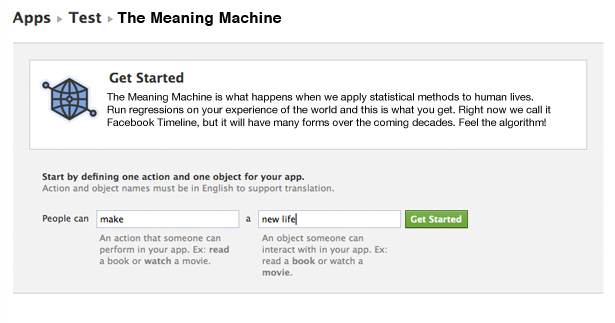The Meaning Machine
Internet users once stalked off into the cyberfrontier looking for transcendence. The new Facebook wants you to understand your life from the comfort of its walled garden.

The Meaning Machine takes all of your inputs at one end -- photographs, status updates, game plays, song listens -- and transforms them into meaning that's organized and designed.
The Meaning Machine is what happens when we apply statistical methods to human lives. Run regressions on your experience of the world and this is what you get. Right now we call it Facebook Timeline, but it will have many forms over the coming decades.
The Meaning Machine relieves you of the struggle to examine your experience of the world. You only need to post status updates and photos. Just live life and record it in social media. The Meaning Machine takes it from there. Feel the algorithm!
The Meaning Machine is part of Mark Zuckerberg's plan to make the world more "open and connected." To him, it is "an important next step to help you tell the story of your life." It helps you "express who you really are." These all seem like objective and good things.
The Meaning Machine works for Mashable's Pete Cashmore. "Much like our memories, Facebook Timeline understands that some moments have resonance that lasts through the years," Cashmore writes at CNN. "It's a marvel of computer programming: An algorithm that comes eerily close to emulating human memory; perhaps the first algorithm to spark such a deep emotional response."
The Meaning Machine does not cost anything monetary. It is free because meaning is valuable to advertisers. What it calculates for you, it also calculates for them.
The Meaning Machine is only as good as what you put into it. So, if you want more meaning, you really should write more status updates and post more pictures, install more apps and watch more videos. Accumulate computer-parsed actions and The Meaning Machine will take care of the rest.
The Meaning Machine is customizable. You can hide whatever you want from other people. But you cannot revise and you cannot hide from The Meaning Machine itself.
The Meaning Machine knows that significant events are those at which many people have cameras and use them to take photos. Without photos or status updates, an event will disappear as quickly as it happened. It won't be relevant.
The Meaning Machine is the social media answer to what Paul Ford calls old media's "Epiphanator," the "giant steampunk machine that organizes time into stories ... and [that] has always known the value of a meaningful conclusion." The Meaning Machine knows that life is but a stream of snippets of text and pictures of varying sizes with occasional videos and data interspersed. It never ends and it doesn't need a conclusion.
The Meaning Machine knows that meaning in today's world never occurs internally, some new understanding that no one else can see (not even in your face in photos). Making meaning is never something you can't describe. It is never made sharper by forgetting or more poignant by unexpected remembrance.
The Meaning Machine is not intended for use by governments. But it will be used by governments.
The Meaning Machine knows that exclamation points indicate feeling.